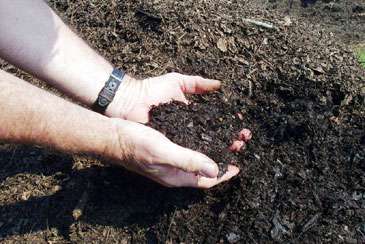Landscaping with a Green Thumb: Composting

In this article, you will find:
Managing and using compost
Help the Pile CookThe more "managed" your pile is, the faster it will produce finished compost. A highly managed pile or a compost tumbler system can give you garden-ready compost in as little as three or four weeks. If you take the passive approach and simply keep adding to the pile, you will find finished compost at the bottom of the pile in about a year's time.
To help keep your pile cooking, follow these tips:
- Make sure the pile stays hotter than the surrounding air. If it's between 104° and 131°F, it will kill pathogens and weed seeds. A compost thermometer can tell you, but you don't need to invest in one. Just make sure you add enough "greens" (e.g., kitchen waste, grass clippings). And when you do, cover the "greens" with "browns" (e.g., shredded leaves, paper) to reduce flies and odor, and to avoid attracting pests.
- Make sure the pile stays moist, but not too wet. Ideally, it should be as moist as a wrung-out sponge.
- Make sure it gets enough air. You can turn it with a pitchfork once or twice during the summer to aerate it. But it's easy to just push several large sticks or branches down through the pile vertically and give them a shake every now and then.
How to Use Compost
Finished compost will be uniformly brown and crumbly, like soil, but usually contains some brown particles of materials that haven't fully broken down. You can be use this compost as is for mulching, spreading a couple of inches of it evenly on top of the soil around plants. However, if you want to mix compost into your soil to enrich it, it's a good idea to screen it to eliminate the particles; they will continue to decompose, reducing the amount of nitrogen available to plant roots.
Compost tea is a wonderful fertilizer for plants, and it's easy to apply. Simply soak a few shovelfuls of compost for a few hours or days in a bucket of water. Pour the resulting "tea" through a screen or cheesecloth into a watering can and feed your plants. The tea will provide beneficial live organisms and improve the soil, and you'll never have to worry about giving the plants too much of it—it won't burn plants.
Related articles:
The Organic Lawn
The Ornamental Garden
The Vegetable Garden

